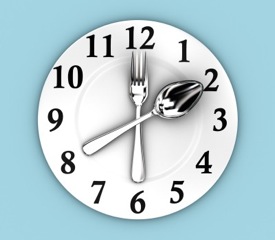As humans, we love a contradiction.
When we hear about Mark Haub, the Kansas State professor who ate nothing but junk food and Twinkies and lost loads of fat in the process, we start thinking about ways to “hack our lives”.
While it’s possible to lose fat by keeping a simple caloric deficit, using such an unorthodox approach is a rare feat.
If you would like permanent fat loss and wellness, there are a few items which are borderline non-negotiable.
Checking off these 10 items all but guarantees you’ll be looking at a slimmer waistline and a healthier body.
The 10 (Almost) Requirements For Permanent Fat Loss:
1. Eat on a regular schedule.
Your schedule is up to you. You may choose to:
- Eat breakfast, lunch, and dinner.
- Skip breakfast and eat just lunch and dinner.
- Skip breakfast AND lunch and eat just dinner.
- Eat every 3 hours with a combination of meals and small snacks.
- Eat 5 days per week and incorporate two, all-day fasts into your routine.
Any of these plans will work. You don’t need to eat every few hours to “stoke your fire”. Your muscles will not “eat themselves” if they don’t get protein every few hours. Breakfast isn’t the most “important meal of the day”, unless you’re a Kellogg’s executive.
When you follow an eating schedule, you will get used to eating at certain times. Perhaps more importantly, you will get used to NOT eating at certain times.
Stick to a regular eating schedule on most days to ensure you aren’t mindlessly grazing, and eating too many calories as a result.
2. Eat primarily whole foods.
Yeah, Jared Fogle lost a bunch of weight eating subs. (I wouldn’t try to imitate Jared Fogle if I were you…..)
Yeah, I know your aunt lost a bunch of weight on the “Special K Diet”.
Yeah, I’m aware of John Cisna, the high school teacher from Iowa who ate McDonald’s for 3 straight months and lost over 50 pounds.
Eventually, you’re going to need to forget all of the “shortcuts” and hacks. You’re going to have to eat like an adult to succeed long-term.
Your plate should look like this: Protein and veggies. A bit of carbs and some fat for taste.
Shop on the fringes of the grocery store like you know you should.
Save the boxed stuff for your kids.
3. Eat vegetables daily.
Sometimes, our coaching clients will send us an email and they insist on skipping the veggies we recommend.
The client will claim an aversion to plant material. It generally has to do with the person’s upbringing. Perhaps they were force-fed asparagus as a child.
We will tell them veggies aren’t a “requirement”, they are simply a “very good idea”.
At our checkpoints, it’s not uncommon for those clients to complain about hunger.
Once they start eating more veggies, the problem always vanishes.
Veggies contain fiber, they are filler, they are chock full of micronutrition and phytonutrients, and you know they are a good idea.
Listen to your mom, dammit. She was right.
4. Make almost all meals at home.
On first glance, you may think the reason behind making your meals at home is obvious.
If you make the meal at home, you know what is in it, and you can ensure it is in line with your calorie goals.
While this is important, I would argue there is another side to it which holds at least as much weight.
If you are regularly dining out, that means you are regularly making decisions.
Even if you’re hitting your macros spot on, you’re tapping into your willpower and your decision making process. Each time you do this, you wear yourself down just a little bit more.
Eventually, you will crack.
Make your meals at home and take them to work. That way, you won’t have to decide a thing – and you can preserve your finite willpower for the times when you really need it.
Like during “Netflix and Chill”.
5. Avoid sugary drinks.
Most people understand they shouldn’t be drinking large amounts of sugary pop.
But put those exact same people in a bar, and many of them will order a sugary drink, no problem.
 If you sit down at a Mexican restaurant and order a large margarita (or daiquiri, or pina colada……), you’re looking at 1,000 calories down your gullet before you can even say “Fiesta”!
If you sit down at a Mexican restaurant and order a large margarita (or daiquiri, or pina colada……), you’re looking at 1,000 calories down your gullet before you can even say “Fiesta”!
The decision to drink alcohol is a personal choice. It’s no big secret that alcohol contains empty calories. You can account for those calories and still stay on point. Many do this – including myself.
As a general rule of thumb, minimize your calories by drinking excess calories from the alcohol itself – not added sugars. For the best bang for your buck, go with unflavored spirits and zero calorie mixers.
6. Make room for your splurges.
We all need to splurge from time to time.
Nobody expects you to bring your low-fat salad to your New Year’s Eve party.
At the same time, if you’re going to be eating to your heart’s content, it will need to be accounted for.
A few options which you may want to think about:
- Don’t eat up until the event and make the event your only meal of the day.
- Eat slightly less the week leading up to the event.
- Eat slightly less the week after the event.
- Fast the day after the event and eat only some lean meat and veggies for dinner.
- Get in two extra cardio sessions the week of the event.
The possibilities are endless – but the point remains: If you’re going to eat big, you’ll need to compensate for your feast with a bit of famine in order to even out the intake.
7. Separate the physical from the emotional.
Our weight is intrinsically tied to our self-worth.
We see our waistlines and instantly think of ourselves as “bad”, “good”, “embarrassing”, “proud”, or any other number of adjectives.
Your physical body is just that —> your physical body.
It’s nothing else and nothing more.
It’s not a reflection of who you are.
See yourself as a character in a “game” – and the objective is to get lean and stay lean.
Constantly work on 1% improvements in your life.
But at the same time, realize that if you mess up, it’s a natural part of the learning experience.
Over time, you’ll become a better dieter.
Become thoughtful in your analysis and accepting of your journey.
And enjoy it – because it’s all yours.
8. Conquer the mental game.
There are few people on this earth who can “outwill” someone forever.
If you’re relying on sheer determination, you can turn over the hourglass now.
And wait………..
Because eventually, you’re going to run out of sand.
You’re going to need to become reflective and learn how to defeat the mental side of dieting.
Work on habits instead of motivation, control your perception of stress, re-frame your thoughts, and find your freedom.
The dieting game is won between the ears.
If you can handle the psychological rigors of dieting, a bit of hunger will be a breeze.
9. Minimize the change.
Making drastic, sweeping changes is a daunting task.
You can’t look at the long road ahead. It’s too difficult to process. If you are always looking ahead into the future, you’ll become less focused on your daily tasks.
Your choices in the present determine your future. Instead of focusing on your goals, focus on the process which will take you to those goals.
- Instead of trying to “lose 50 pounds”, focus on packing a satisfying (and healthy) lunch each day.
- Instead of trying to “fit into your skinny jeans”, focus on staying hydrated with water.
- Instead of trying to “get a 6-pack”, focus on not missing a workout this week.
Goals are fine to have – but they are often so lofty and grandiose that they can cause anxiety to focus on them.
Make your changes seem small and doable – like “baby steps” – by minimizing the change into tiny, actionable “brush strokes” which will help to paint the big picture.
10. Record your progress regularly. Or disregard data completely.
You really have two choices here: Record your progress regularly, or never record it at all.
The path you choose is up to you. Both methods can work.
If you choose to record your progress regularly, take a large amount of objective data. Take pictures every 2 weeks, take body measurements every week, weigh yourself daily, etc.
Be mindful of the limitations that scale weigh has. Make sure you look at things rationally and re-read item #7.
Or take the opposite approach. Throw away your scale, take zero data, and focus entirely on building good habits and how your clothes fit.
Which method you choose has much to do with how obsessive you are. If you can make sure upsetting data won’t cause you to go off-track, then recording your progress works like a charm to ensure results.
If recording too much data will make you neurotic and OCD, toss everything away and focus entirely on your habits.
We’ve had clients do well in both scenarios.
Instead of going for the latest fad or the quickest fix, let’s get at the underlying problem.
We all instinctively know that “easier” rarely is “better”.
Let’s build positive habits and move towards a slimmer, healthier you.
One step at a time.
Yours in true health,
Jason


